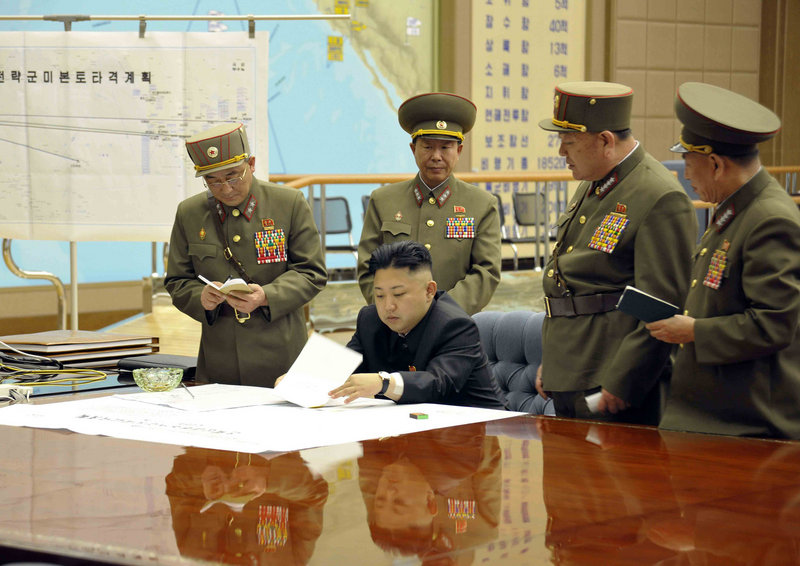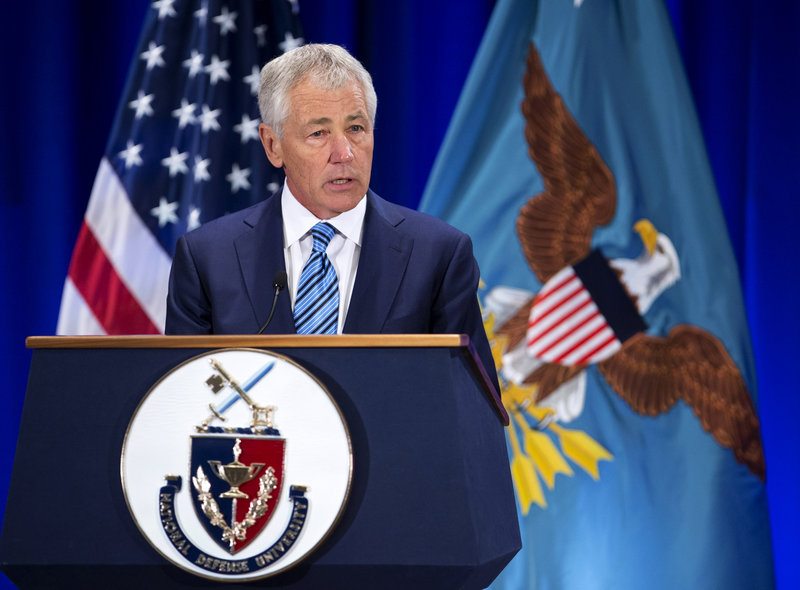The North Korean army warned the United States on Wednesday it has been cleared to wage nuclear war using “smaller, lighter and diversified weapons.”
In a speech earlier in the day, Defense Secretary Chuck Hagel noted that North Korea has the nuclear weapons and the delivery system “now.”
It’s the latest round in an escalation of rhetoric and actions that began with a North Korean nuclear test in February. Still, military officials and experts don’t expect North Korea to launch an attack on the United States. In fact, they label such an attack as suicidal, and note that while North Korea has had one almost successful test launch of an intercontinental missile, and carried out their third apparently successful nuclear test explosion, it is thought they still only have the materials for perhaps 10 weapons, and they have yet to prove their missile works with a nuclear warhead.
For comparison, the United States has 4,650 working nuclear warheads and an array of delivery systems.
Those who study the Hermit Kingdom have very serious doubts that any attack on the U.S. or allies South Korea and Japan is even being seriously considered.
“It could be there’s a whole other game going on,” said Stephen Long, a North Korea expert at the University of Richmond.
Little is still really known about the young and untested North Korean leader, Kim Jong Un. Even his age, either 29 or 30, is uncertain. But in recent weeks, the “glorious successor,” as he is known inside his sheltered nation, one of the few remaining communist dictatorships, has said that “the time has come to settle accounts with the U.S. imperialists.”
He warned of a conflict that “will not be limited to a local war, but develop into an all-out war, a nuclear war.”
Reaction at the Pentagon has been relatively calm: an almost daily effort to state American solidarity with South Korea and to defend territory and allies. Missile defenses have been positioned in the region, including Wednesday’s announcement of a land-based system to be deployed to protect Guam.
The U.S. also recently announced a billion-dollar upgrade to its missile-defense system in Alaska.
But those who watch North Korea closely don’t think the audience for Kim’s saber-rattling was the wider world he appeared to be threatening, but the small band of elites without which he can’t maintain total control.
“It’s probable that he was trying to appease military hardliners with his threats,” said Ellen Kim, an expert on North Korea at the Center for Strategic and International Studies, a non-partisan Washington think tank.
The actual threat may be minimal, but that Kim felt compelled to make such threats might be very worrying, experts said.
North Korea continues to struggle under Kim. The nation is poor, the people often starving, and it remains overly reliant on China for trade. Kim needs to retain the loyalty of the military, the most significant power base outside of himself.
Jina Kim, who studies North Korea from Seoul’s Korea Institute for Defense Analyses, is concerned the recent rhetoric is a sign of “potential friction among elites.”
“It was reported that Kim Jong Un has ordered troops near the demilitarized zone not to make any mistake that can be utilized by (U.S. and South Korean) forces to use force against the North,” she said, noting that he pointedly told troops to be cautious. But as the rhetoric escalated, the North Korean leader was reshuffling his inner circle.
“The fact that organizational change continues means that North Korea’s political stability has not yet been realized,” she said.
The strongest sign of discord might be that recent moves appear to have angered China, something that would not be done lightly. In the United Nations Security Council, China voted in favor of harsh sanctions on North Korea after a February nuclear test.
“The top priority now is to defuse the tension, bring down heat, focus on the diplomatic track,” said Chinese U.N. Ambassador Li Baodong.
Instead, Kim Jong Un ratcheted up the tension.
Long called a deeply divided North Korean elite “a worst-case scenario.”
If military hardliners are rejecting Kim’s rule for not being aggressive enough, that would leave the rest of the region and the world to deal with unhappy and nuclear-armed generals.
“If Jong Un’s government fails, the likelihood is that whoever takes his place would be far more hard line,” Long said.
In addition to threatening nuclear war, testing a nuclear device, testing long-range missiles, declaring that the war with South Korea is still on and restarting an old nuclear reactor, North Korea cut off access to the Kaesong industrial park on Wednesday. South Korea’s Yonhap News Agency quoted an unnamed official as saying, “Although the action taken is serious, it is not without precedence.”
Send questions/comments to the editors.




Success. Please wait for the page to reload. If the page does not reload within 5 seconds, please refresh the page.
Enter your email and password to access comments.
Hi, to comment on stories you must . This profile is in addition to your subscription and website login.
Already have a commenting profile? .
Invalid username/password.
Please check your email to confirm and complete your registration.
Only subscribers are eligible to post comments. Please subscribe or login first for digital access. Here’s why.
Use the form below to reset your password. When you've submitted your account email, we will send an email with a reset code.